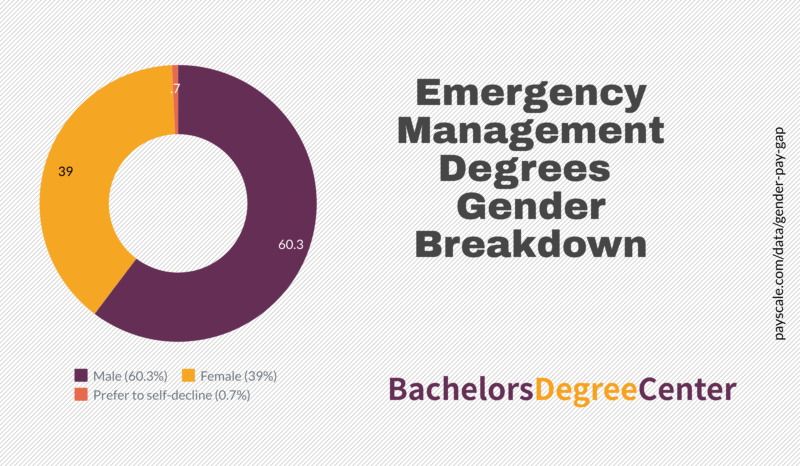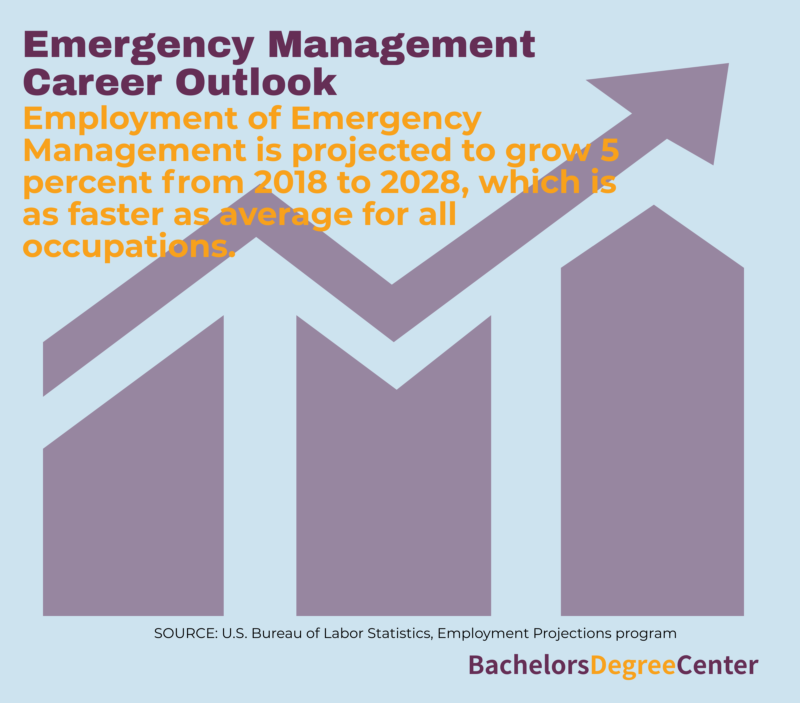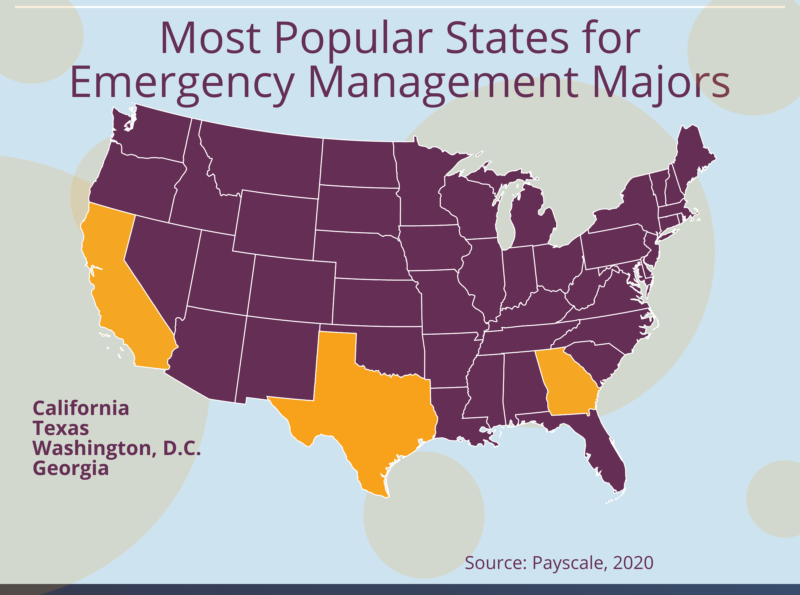Key Information:
- Graduates often take on roles that involve coordinating and managing responses to emergencies and disasters.
- Opportunities exist in various sectors, including government agencies and private industries.
- The degree equips individuals to anticipate, strategize, and manage responses to potential hazards and disasters effectively.
Are you interested in obtaining your bachelor’s degree in Emergency Management and wondering what you can do with an emergency management degree?
If so, be certain to answer these questions as you decide which emergency management academic program would best fit your needs –
- What is an emergency manager?
- What can I do with a degree in emergency management?
- What is Emergency Management?
Those who graduate with a bachelor’s degree in emergency management are responsible for coordinating the efforts to help organizations and communications anticipate and prepare for potential hazards or disasters. These types of jobs are available in the government sector or private industries.
What is Emergency Management?
The concept of emergency management began in 1979 with the development and creation of FEMA – the Federal Emergency Management Agency. It was at this time that several federal agencies merged to create FEMA.

Emergency management can be broken down into three fundamental interrelated categories –
- All Hazards – it has been shown that the same emergency preparedness plan can be effectively applied to all emergencies.
- The Emergency Life Cycle – disasters occur over time in a series of cycles. Each cycle is matched with managerial phases that include –
- Strategizing against potential hazards and disasters.
- Mitigating potential hazards.
- Preparing for Emergencies and disasters.
- Responding to Emergencies and natural disasters.
- Recovering from the effects of the emergency or the natural disaster.
- The Emergency Management Partnership – this facet of emergency management has to do with coordinating emergency management services. It requires the maintenance of partnerships with agencies from many government levels, plus the private and volunteering sectors.
School and Program Accreditation in Emergency Management
Accreditation is a standardized process that requires third-party professionals – with the authority to perform such a function – to comprehensively assess the contents and delivery of academic degree programs. Accreditation is an important function of the education system in the United States.
The process of accreditation provides students with the assurance that the education they receive is the same as the education promised by the school. Consider it a ‘gold star’ issued to the school by an approved accreditation agency.
In the U.S., there are a variety of programs and schools that offer training and education at a variety of levels. One type of accreditation is performed by governmental agencies. Other types of accreditation are performed by professional oversight agencies, that are very often approved by government education agencies or the industry itself. Private oversight companies evaluate universities, professional schools, colleges, and the academic degree programs they offer.
The accreditation process requires a comprehensive evaluation procedure to determine if the school or the academic program meets the accreditation criteria that have been established by the government or industry. The school or academic program meets the accreditation criteria; the school is awarded accreditation, which allows the school to inform potential students that the school or the program has met the accreditation muster.
Ultimately, it is the accreditation process’s objective to make sure that students interested in attending a school understands that the school or program has been evaluated to discern if it meets accreditation standards.
The broadest type of accreditation is regional accreditation, which one of the nine regional government oversight agencies performs. The more specific accreditation process is specialized accreditation. Sanctioned oversight agencies in each industry perform specialized accreditation.
Regional Accreditation
The USDE – the United States Department of Education is the federal government agency tasked with the responsibility of accrediting schools and programs throughout the country. Each agency is tasked with the responsibility of administering to the school’s in a certain based on the school’s program merit and content. Overall, most regionally accredited higher learning institutions are usually state-funded, not for profit, and academically oriented.
Specialized Accreditation
Specialized accreditation is awarded to those academic programs or schools that meet certain criteria established by experts in the field. Specialized accreditation offers students a bit of assurance that the program they attend will properly prepare them for a career in emergency management.
It is noted that specialized accreditation voluntary. Schools must proactively choose to open their programs and schools to accreditation officials to evaluate the school and program.
It is critical for emergency management students to recognize that when transferring between schools while earning a degree that the new school will much more readily accept any earned credits from accredited emergency management schools. In fact, many schools do not permit credit transfers that have not been awarded by an accredited college.
EMAP – The Emergency Management Accreditation Program
The Emergency Management Accreditation Program – EMAP, is a nonprofit organization that operates independently by fostering accountability and excellence in those programs designed to offer academic degrees in emergency management. EMAP accomplishes these objectives by establishing professional standards that are applied to their accreditation procedure.
EMAP understands that emergency management programs are ideal for coordinating resources in establishing the finest emergency management training programs. EMAP’s criterion is flexible enough to assess programs of any size and is offered as a blueprint for emergency management programs of the future.
Ultimately, EMAP assesses those emergency management programs based on the program’s compliance with sixteen fundamental areas that include –
- Resource Management.
- Administration.
- Planning.
- Exercises.
- Evaluations.
- Training.
- Warning.
- Actions to correct deficiencies.
- Communications, to name a few.
It is noted that the Emergency Management Accreditation Program – EMAP – is the only accreditation provided to those programs designed for emergency management majors.

Types of Emergency Management Degrees
Emergency management professionals are tasked with the responsibility of helping large populations feel safe in the wake of a fire or earthquake. Most emergency managers work in the field for a government agency or nonprofit director. So what is an emergency management degree, and why do I need one?
At one time, the emergency manager’s role was to plan and be prepared to respond to emergencies. In fact, most emergency managers had backgrounds in law, fire, or the military – typically with tremendous field experience and training.
However, recently, the emergency management profession has been slowly morphing from a narrow focus to a more multi-level profession that can encompass everything from risk management to human resources. Because of cyberattacks, information technology experts are key to emergency management. Because of these developments, emergency management programs have been revamped to create a training and educational program that meets the paradigm for the newly defined emergency manager. Fortunately, there are many emergency management online degrees or on-campus programs from which to select.
As a result, online emergency management degrees offer both training and hands-on experience to degree candidates, who, when graduating, find gainful and rewarding careers in a variety of sub-specialties. But, before one enrolls in an emergency management online degree, it is essential to consider which of the emergency management degree concentrations would meet your education goals.
For example, if you have an interest in working full-time for a government agency, a degree in emergency management online with a public safety concentration would be a great choice. This concentration for an emergency management degree online would require a student to complete classes learning how to respond to natural disasters, terroristic threats, or other catastrophes. Coursework in public safety and public health will also delve deeply into how to manage emergency plans for communities.
Let’s review some of the more popular emergency management degrees online and on-campus programs. With online programs, you can study part-time while working.
Emergency Management Degrees Online – Fire Science
Students who possess a strong interest in a career as a firefighter should consider the emergency management concentration of fire science. The field of fire science focuses primarily on the prevention of fires and the protection of people from fire. A fire science degree in emergency management online will include coursework in fire combustion, fire management, fire analysis, and the practices that lead to fire prevention.
Emergency Management Online Degree – Homeland Security
The Department of Homeland Security (DHS) is high level government agency – which is the reason why homeland security emergency management online degrees are one of the more popular emergency management focuses. The DHS – the Department of Homeland Security (DHS) is responsible for protecting Americans both at home and abroad. The DHS was created after the horrific events of 9/11, with coordinating efforts by the Border Patrol, the Navy, and other related agencies. Coursework for a homeland security concentration will explore investigations, plus agents’ roles & responsibilities.
Emergency Management Degrees Online – Disaster Relief
Most would agree that when you consider an emergency manager’s role, you think directly about the tasks of a disaster relief profession. This is one of the reasons that disaster relief is one of the more popular academic tracks for those studying for one of the quality online emergency management degrees offered. A disaster relief profession is concerned directly with the issues that occur before, during, and after a natural disaster. Those studying for a disaster relief concentration for an emergency management degree will complete coursework to coordinate medical help and supplies for those who are harmed or displaced by a hurricane or earthquake. Policymakers involved in disaster relief prepare government agency plans for relief in the event of a disaster.
Online Degrees in Emergency Management – Child Protection
The child protection emphasis offered in some online degrees in emergency management is an ideal focus for those individuals who have a keen desire to work in the social work field and enjoy working with children of any age. A child protection concentration in an emergency management program trains you to evaluate a child’s needs and then to know how to find the resources to meet those needs. Classes will also include working with families in the juvenile system using therapeutic techniques.
License and Certification in Emergency Management
One of the most efficient & effective techniques that can be used to advance within any career is to earn one of the industry’s licenses or certifications. This is true in the emergency management field, where you can earn a certificate of emergency management from a number of professional organizations.
An emergency management certification reveals to potential employers that you have met recognizable criteria in the state in which they work. Many job descriptions or announcements will request that job candidates hold an emergency management certification, so if you need the emergency management certificate to secure a certain job, you will have the appropriate certification in emergency management that you will need to apply.
Another way to view a certificate in emergency management is to consider it one of the legitimate ways to build your resume. There are several nations emergency manager certification designations from which to choose. These emergency management certification options include –
- The Associate Emergency Manager (AEM) certification.
- The Certified Emergency Manager (CEM) certification.
Each of these emergency management certification programs is administered by the International Association of Emergency Managers (IAEM), the largest national association in the emergency management arena. These are discussed in detail below.
The AEM Certificate in Emergency Management
The Associate Emergency Management (AEM) certificate of emergency management is designed for those who have not met every requirement of the Certified Emergency Manager certification but want to earn some type of certification. To earn an AEM certificate in emergency management online the applicant must meet the following requirements –
- Have a minimum of 100 hours in the field of emergency management training.
- Pass a multiple-choice test that encompasses 100 questions.
- Submit a written, comprehensive essay detailing the applicant’s experience and skills in the field of emergency management.
The CEM Certificate in Emergency Management
The Certified Emergency Manager certification (CEM) is offered to those professionals reaching for the pinnacle of their emergency management careers. The professional who earns their certificate of emergency management has reached the height of To earn this certification in emergency management an applicant must meet the following requirements –
- Possess sufficient experience as a professional emergency manager.
- Hold a valid baccalaureate-level degree from an accredited institution of higher learning.
- Have a documented emergency management training of at least 100 hours.
- Have the ability to verify that the emergency manager certification candidate has contributed to the emergency management industry on a minimum of six different occasions. These contributions can include professional memberships, the authoring of articles related to emergency management, or speaking engagements, to name a few.
- Submit a written, comprehensive essay detailing the applicant’s experience and skills in the field of emergency management.
- Pass a multiple-choice test that encompasses 100 questions.
Emergency Management Certification Online
It is noted that emergency management certification programs are available online. Students interested in obtaining their emergency management certification online are advised to do their due diligence to ensure the emergency management certificate program they choose meets their education and career objectives. These certification in emergency management programs are also offered through a hybrid delivery of coursework.

Careers in Emergency Management: What Can You Do with an Emergency Management Degree?
Emergency management degree jobs exist all over the world, and emergency management entry-level jobs are competitive. Job openings are filled quickly. As you consider your emergency management career path it is important to remain focused on these relevant questions –
- What does an emergency manager do?
- What can i do with an emergency management degree?
- What kind of entry-level emergency management jobs can I expect?
- Are there any suggested career tips for emergency management degree candidates?
- What does an emergency manager job description say?
- How does emergency management job description differ from that of an emergency management specialist job description?
- Are there jobs in emergency management that would meet my career objectives?
- Is it possible to pursue an emergency management consultant with an online degree?
- What are the available private sector emergency management jobs?
- What are my options regarding available careers in emergency management?
- What are my options for careers in disaster and emergency management?
- How does an emergency management director job description differ from that of an emergency management coordinator job description?
Emergency managers should understand that certain industries that employ the largest number of emergency managers are as follows –
- State, federal, and local government agencies.
- Surgical or Medical hospitals.
- Emergency Relief Services.
- Housing Agencies.
- Electric power plants.
- Community Food Banks and Agencies, to name a few.
Job titles for those with emergency and disaster management careers may differ depending on whether the position is one of the private emergency management jobs or government-based emergency management services jobs. If you want a federal job, head to Washington, DC.
For instance, those with emergency management careers in the private industry may find that their emergency management specialist career title is a business recovery planner or a public safety specialist.
It’s crucial that job seekers develop their communication skills to increase their employment opportunities. Risk mitigation in an emergency situation depends on being able to express what is needed clearly and under pressure.
Examples of Jobs in Emergency and Disaster Management
As you consider the many available disaster and emergency management careers – look into job postings for these popular careers in emergency management.
- An Emergency Management Specialist
- A Safety Specialist
- An Emergency Response Team Lead
- A Disaster Recovery Management Specialist
- An Environmental Health & Safety Specialist
- A Director of Emergency Services
- A Hurricane Program Specialist
- An Environmental Safety Management Specialist
- A Preparedness Administrator for a Hospital or Agency
- An Emergency Planner for Nuclear Events
Jobs in Emergency Management by Industry
While the emergency management careers noted below do not reflect entry-level emergency management jobs, this industry data provides insight into the top-paying jobs for emergency managers. To understand how to strive towards this pinnacle of emergency management career success, it is important to start by reading an emergency manager job description carefully.
| Emergency and Disaster Jobs – Top Paying by Industry | Emergency and Disaster Management Jobs Salary |
| Federal Executive Brand | $155,450 per year |
| Natural Gas distribution | $125,320 per year |
| Business/Professional/Political | $122,560 per year |
| Research and Development | $122,140 per year |
| Electric Power | $118,430 per year |
The industries that contain the highest concentration of employment for emergency managers include the following –
| Emergency and Disaster Jobs – Top Paying by Industry | Number of Jobs | Emergency and Disaster Management Jobs Salary |
| Local Government – No schools | 5,250 | $73,410 per year |
| State Government – No schools | 1,470 | $70,330 per year |
| Electric Power Industry | 220 | $118,430 per year |
| Ambulatory Health Services | 110 | $77,670 per year |
Emergency Management Salary
According to the statisticians at the federal government’s Bureau of Labor Statistics, there were more than 9.750 emergency management professionals working in the United States during 2019. In addition, the BLS notes that the median emergency management jobs salary for 2019 was $74,590.
The emergency management degree salary range is as follows –
- At the low end of the emergency management salary scale, the annual wage is $40,430 per year.
- At the high end of disaster and emergency management salary scale is $141,230 per year.
Top paying metropolitan areas that offer the highest emergency management degree salary include -
| Emergency and Disaster Jobs Highest Paying Jobs by State | Crisis and Disaster Management Salary |
| San Francisco, Oakland, CA | $132,440 per year |
| San Diego – Carlsbad, CA | $123,230 per year |
| DC ‑VA – MD — WV | $120,230 per year |
| LA – Long Beach, Anaheim, CA | $118,880 per year |
| Idaho Falls, ID | $116,530 per year |
Top paying states that offer the highest emergency management degree salary include -
| Emergency and Disaster Jobs Highest Paying Jobs by State | Crisis and Disaster Management Salary |
| District of Columbia | $120,680 per year |
| California | $117,900 per year |
| Washington | $113,220 per year |
| Maryland | $106,310 per year |
| New York | $100,290 per year |
Top paying non- metropolitan areas that offer the highest emergency management degree salary include -
| Emergency and Disaster Jobs Highest Paying Jobs by State | Crisis and Disaster Management Salary |
| Alaska Nonmetro | $103,190 per year |
| Southwest Main nonmetro | $ 61,020 per year |
| Southeast Oklahoma nonmetro | $ 56,170 per year |
| West South Dakota nonmetro | $ 54,940 per year |
| Kansas nonmetro | $ 48,060 per year |

Professional Organizations in Emergency Management
A professional organization is typically dedicated to supporting and serving the interests of the professions in a particular field.
- The International Association of Emergency Managers (IAEM) – this professional organization operates across the globe and is dedicated to the promotion of emergency management principles.
- The International Association for Preparedness and Response (DERA) – this professional organization helps emergency management professionals, organizations network with other disaster preparedness and emergency management professionals.
- The Association of Healthcare Emergency Preparedness Professionals (AHEPP) – this professional organization is committed to the advancement of the disaster preparedness and response field.
- The National Emergency Management Association (NEMA) – this professional organization offers membership to emergency management professionals.
- The U.S. First Responders Association (USFRA) — this professional organization operates a non-profit social network for professionals who are police officers, military, firefighters, EMS, and civilian support members.
- The National Information Officers Association (NIOA) – this professional organization offers membership to North American emergency service government emergency services professionals.
